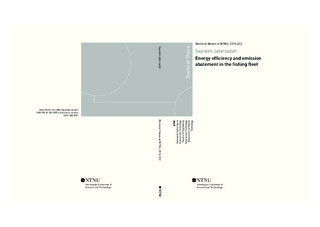| dc.contributor.advisor | Ellingsen, Harald | |
| dc.contributor.advisor | Utne, Ingrid Bouwer | |
| dc.contributor.author | Jafarzadeh, Sepideh | |
| dc.date.accessioned | 2017-03-02T10:06:55Z | |
| dc.date.available | 2017-03-02T10:06:55Z | |
| dc.date.issued | 2016 | |
| dc.identifier.isbn | 978-82-326-2003-6 | |
| dc.identifier.issn | 1503-8181 | |
| dc.identifier.uri | http://hdl.handle.net/11250/2432687 | |
| dc.description.abstract | Operation of fishing vessels is energy demanding. On one hand, fuel costs and preference of customers for buying “green” seafood products challenge economic feasibility of fisheries. On the other hand, environmental concerns and regulations further complicate the situation. All these call for an improved environmental profile within fisheries. This PhD study aims at contributing to the research body by focusing on energy efficiency and emission reduction within fisheries.
The topic of emission reduction spans across several disciplines. Different factors, such as vessel characteristics, regulations, and social aspects affect fuel consumption and air emissions of fishing vessels. As a result, this PhD study is interdisciplinary. Since the focus is on several disciplines rather than one specific area, systems thinking has dominated this study. In this way, the focus is on “the big picture” and various factors and interactions that affect energy consumption and emissions rather than on one specific factor.
First, this study focuses on reducing the air emissions indirectly by increasing energy efficiency of vessels. To set a baseline, it statistically analyzes energy efficiency of Norwegian fisheries in recent years. Then, through literature review and focus groups, this study investigates barriers that prevent the adoption of energy-efficient measures that are cost-effective. A framework is also offered to assist ship owners and operators in alleviating these barriers. Then, the study focuses on increasing the knowledge of ship owners and operators about the energy efficiency of their vessels and available measures in order to facilitate their adoption. In this regard, the power system of a fishing vessel is modelled and simulated to study energy consumption for various operations.
Second, this study explores the possibility of fuelling fishing vessels by liquefied natural gas (LNG) and reducing emissions directly. In this regard, this study reviews the literature to identify pros and cons of using LNG on fishing vessels. Then, the systems engineering approach is used to increase the knowledge of ship owners, naval architects, and crew on safety and financial aspects of using LNG. The aim is to assist these stakeholders to make better-informed decisions when assessing the suitability of LN.
The main contributions of this thesis are as follows:
- The analysis of energy efficiency in Norwegian fishing fleet,
- Providing a framework for overcoming the barriers to energy efficiency in shipping,
- Investigating interactions between environmental regulations in shipping and fishing,
- Making a decision-making support that advises on fuel consumption of vessels and effectiveness of energy-efficient measures, and
- Clarifyingthe technical aspects of LNG-fuelled systems, their potential implementation costs, and the expertise and training needed for operating them in a safe manner.
The results of this study show the benefit of taking a holistic view on the topic of energy efficiency and emission abatement in fisheries. In this way, “the big picture” is not lost due to focusing on a single aspect. This approach has the benefit of investigating the problem from different angles and identifying different influential elements. In addition, it highlights the interactions among these elements and their possible effects on the overall environmental performance. Such interactions may be overlooked by focusing on specific aspects. | nb_NO |
| dc.language.iso | eng | nb_NO |
| dc.publisher | NTNU | nb_NO |
| dc.relation.ispartofseries | Doctoral theses at NTNU;2016:332 | |
| dc.relation.haspart | Paper 1:
Jafarzadeh, Sepideh; Ellingsen, Harald; Aanondsen, Svein Aanond.
Energy efficiency of Norwegian fisheries from 2003 to 2012. Journal of Cleaner Production 2016 ;Volum 112, Part 5. s. 3616-3630
https://doi.org/10.1016/j.jclepro.2015.06.114
The article is reprinted with kind permission from Elsevier, sciencedirect.com | |
| dc.relation.haspart | Paper 2:
Jafarzadeh, Sepideh; Utne, Ingrid Bouwer.
A framework to bridge the energy efficiency gap in shipping. Energy 2014 ;Volum 69. s. 603-612
https://doi.org/10.1016/j.energy.2014.03.056
The article is reprinted with kind permission from Elsevier, sciencedirect.com | |
| dc.relation.haspart | Paper 3:
Jafarzadeh, Sepideh; Ellingsen, Harald.
Environmental Regulations in Shipping: Interactions and Side Effects. I: ASME 2016 35th International Conference on Ocean, Offshore and Arctic Engineering - Volume 7: Ocean Engineering. ASME -
Is not included due to copyright available at
http://dx.doi.org/10.1115/OMAE2016-54646 | |
| dc.relation.haspart | Paper 4:
Jafarzadeh, Sepideh; Pedersen, Eilif; Notti, Emilio; Sala, Antonello; Ellingsen, Harald.
A Bond Graph Approach to Improve the Energy Efficiency of Ships. I: 33rd International Conference on Ocean, Offshore and Arctic Engineering Volume 8B: Ocean Engineering. ASME
Is not included due to copyright available at
http://dx.doi.org/10.1115/OMAE2014-24026 | |
| dc.relation.haspart | Paper 5:
Jafarzadeh, Sepideh; Ellingsen, Harald; Utne, Ingrid Bouwer.
Emission reduction in the Norwegian fishing fleet: towards LNG?. 2nd International symposium on fishing vessel energy efficiency; | |
| dc.relation.haspart | Paper 6:
Jafarzadeh, Sepideh; Paltrinieri, Nicola; Utne, Ingrid Bouwer; Ellingsen, Harald.
LNG-fuelled fishing vessels: A systems engineering approach. Transportation Research Part D: Transport and Environment 2017 ;Volum 50. s. 202-222
https://doi.org/10.1016/j.trd.2016.10.032
The article is reprinted with kind permission from Elsevier, sciencedirect.com | |
| dc.title | Energy efficiency and emission abatement in the fishing fleet | nb_NO |
| dc.type | Doctoral thesis | nb_NO |
| dc.subject.nsi | VDP::Technology: 500::Marine technology: 580 | nb_NO |

